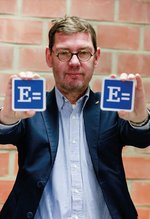
Faculty of Physics
The outstanding event for the Faculty of Physics in 2015 and 2016 was its successful application to establish a new collaborative research centre. The good news was announced on 25 May: the Collaborative Research Centre 1242 ‘Non-equilibrium Dynamics of Condensed Matter in the Time Domain’ had been approved by the German Research Foundation.
Two years of preparation time, 400 application forms, 32 posters for presenting the scientific projects, many rehearsal presentations, 20 presentations during inspections, five closed meetings, countless discussions and approximately 2,000 litres of coffee were needed to gain up to ten million euros for research over the next four years.
The establishment of the Collaborative Research Centre by the German Research Foundation is a marker of scientific excellence – I would like to congratulate all those involved and wish them every success.
This research report documents research projects from this area, but also showcases a few examples of just how diverse research in physics can be. Members of Prof. Gerhard Wurm’s research group experimented in the depths of the Bremen Drop Tower – you can read about what they researched during the short period of weightlessness in the next section.
Prof. Heiko Wende introduces what magnetism could mean for refrigerators in the future. Prof. Michael Farle optimises the composition of permanent magnets – we could all benefit from energy-saving electric motors. Energy-saving electronics may possibly be the result of the theoretical basic research of Prof. Rossitza Pentchewa. Prof. Peter Kratzer also researches theoretical physics with methods that convert heat into electrical energy.
By now word has got around that a few laws familiar to us in everyday life lose their validity on the atomic level – what happens exactly during the transition to the normal world is being researched by Prof. Klaus Hornberger.
Prof. Heike Theyßen and Prof. Hendrik Härtig are pursuing a completely different track – they are researching how the experimental ability of school pupils is fostered.

